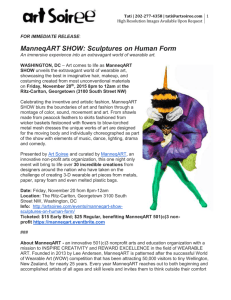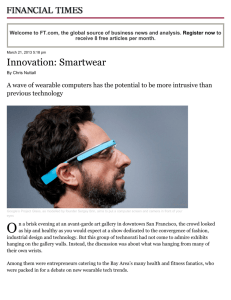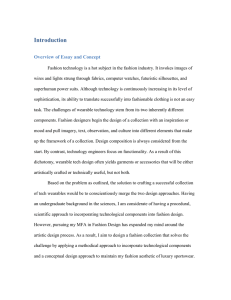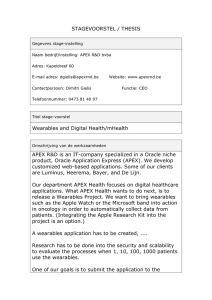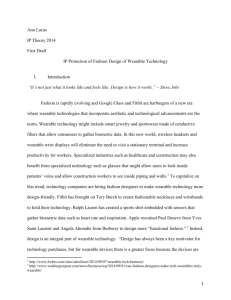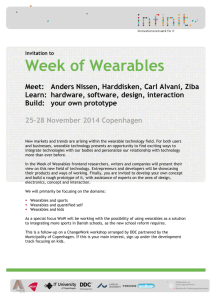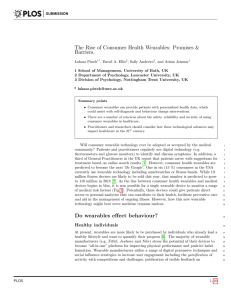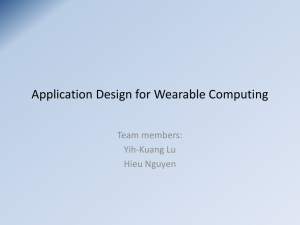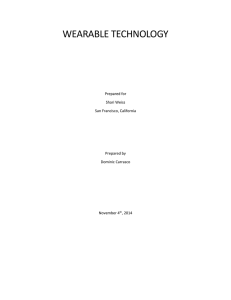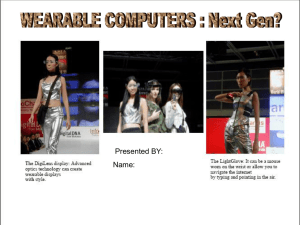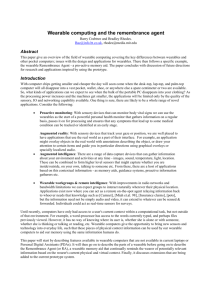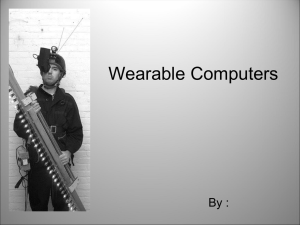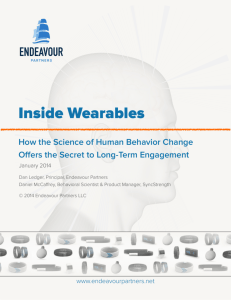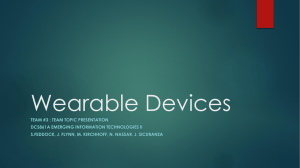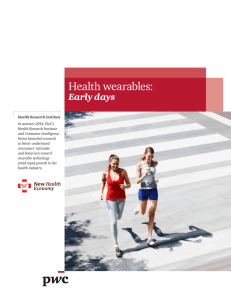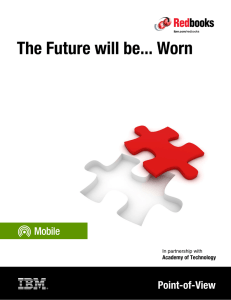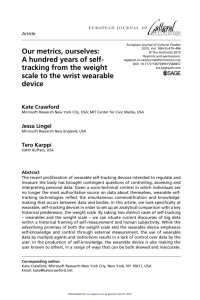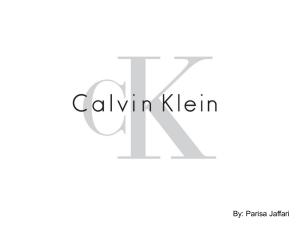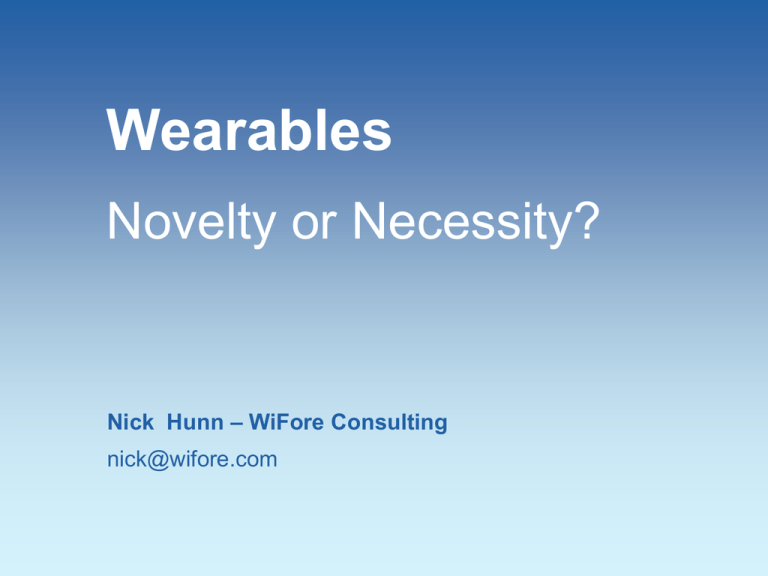
Wearables
Novelty or Necessity?
Nick Hunn – WiFore Consulting
nick@wifore.com
The verdict from the shows was that 2014
will be the Year of the Wearable
They’re not new – we’ve had Wearable
Technologies for over 10 years.
It’s what used to be called the
Quantified Self.
WEARABLE
TECH
of 2OO4
Ecouterre – the ecoFashion website
has been holding a public vote on
Wearable Tech for 5 years and is a
good indicator of how the public
perception of the market has
changed in that time.
www.ecouterre.com
In 2013, it began to look
like this.
Technology made way
to lifestyle and fashion.
Fashion became king
There are wearables for babies
Even wearables to tell you your kids are drowning
As well as Wearables for Pets
This one isn’t serious…
But this is one of many that you can buy today.
There’s even Wearable Tech for your Barbie!
There’s another
trend in Wearables
Discarding altruism
for fashion
It’s not all fashion – Google recently announced a
glucose monitoring contact lens for diabetics
The same concept picked by Ecouterre in 2009
WEARABLE
TECH
of 2OO9
Wearable Tech used to be about helping society
deal with health issues
And enabling Assisted Living
Now it’s about
Objects of Desire
Which at least recognises the
need for a business model.
The Big Question is:
Will we move past wristbands in 2014?
Behind the glister
a perfect storm is forming
Previously disparate industries are starting to
come together
Tech
Fashion
Medical
Sport
Albeit only tentatively
Tech
Fashion
Medical
Sport
The big change is low cost sensors
The availability of small, cheap, micro-electromechanical
sensors (MEMS) has rocketed.
MEMS Shipments
2007 – 10 million
2014 – 3.5 billion
2020 – 300 billion
They measure movement,
position, temperature,
activity and vital signs, but
only cost a few tens of cents.
Initially developed for cars, they’re now in every smartphone,
tablet and wearable device.
Along with the availability of low cost wireless
Bluetooth low energy (also known as Bluetooth Smart)
has changed the game.
– It’s low power, running on coin cells
– It’s already in hundreds of millions of smartphones and tablets
– It’s designed to work with low power sensors
– Chips are available combining it with application processors
– It’s cheap (~$1)
Bluetooth SMART is the first wireless
standard specifically designed to be
easy and flexible for designers to use,
allowing it to be applied to totally new
connected product designs.
The glue binding these
together is:
The Internet of Things
Analysts predict over 50 billion connected devices
will be in use by 2020, generating a tsunami of
personal data.
A significant proportion of those could be
wearable devices.
It’s never been easier to make products
Crowd-sourcing is funding a new
wave of hardware innovation.
Reference designs from silicon
vendors mean products can be
developed much faster.
Far Eastern ODMs are keen to
support any new product or
company which moves them
away from a dying PC market.
Pebble Watch: $10M
Emotiv: $1.6M
Large companies are close behind
• Samsung is engaging startups that it will fund with
early-stage investments in the $100,000 to $2 million
range from its $100 million accelerator fund.
• Apple has been hiring health sensor experts (from
Sano Intelligence, Proteus Digital, Vital Connect, C8
Medisensors, Masimo and Senseonics).
• Intel has demonstrated intelligent ear-buds which
choose music based on your heart rate.
As PC and laptop markets start to die, the pace of
smartphone evolution slows and smart watches fail to
inspire, market leaders are looking to wearables as
the saviour of their industries.
Hardware and Wireless
aren’t enough
They may be pretty, but by themselves, your
wearable is just a Hardware App
The market will be won by companies that
understand the value of data insight.
BUT…
Lots of data needs new business models,
which bring new problems.
Nobody expected wristbands to be worn 24/7
What does all that data tell the manufacturer?
When people actually go running.
And how often?
How often you’ve had sex.
Whether anyone else was there?
And who they were?
Whether you have a prostate problem?.
Or a urinary tract infection?.
How does that change your responsibility?
Successful companies will employ:
Data Scientists
Behavioural Scientists
Fashion Designers
Ethicists
Do you?
Designers need to think past sensors and hardware
The new game is about data.
A way of
packaging
sensors
Moving
the data
Hardware Model
A way of
storing data
Constantly
evolving
analytics
Compelling
customer
feedback
Service Model
Unless you complete the chain, wearables are only “Fashion Tech”
Multiple service purchases are key
Individual Purchases of Appcessories
To reach the connected
wearable device numbers,
consumers will need to
have multiple devices.
The industry needs to find
way of making devices
compelling for three years
or more.
3000.0
2500.0
10+ Appcs
6-10 Appcs
4-5 Appcs
3 Appcs
2 Appcs
1 Appc
Gifted Appcs
2000.0
Millions
Unless services are
renewed, devices will be
discarded.
Number of wearables and associated apps
3500.0
1500.0
1000.0
500.0
0.0
2014
2015
2016
2017
2018
2019
2020
Source: WiFore
It opens up a market opportunity for wearable device service providers,
who can manage multiple devices and generate compelling insight.
Wearables can be objects of beauty
• To be successful, they also need to enable compelling
applications which can generate sustainable revenue.
• Otherwise, they’re just pretty hardware, and that could be
a very limited market.
Nick Hunn
CTO
mob: +44 7768 890 148
email: nick@wifore.com
web: www.wifore.com
Creative Connectivity Blog: www.nickhunn.com
LinkedIn: www.linkedin.com/in/nickhunn
Essentials of Short Range Wireless: www.wireless-book.com


